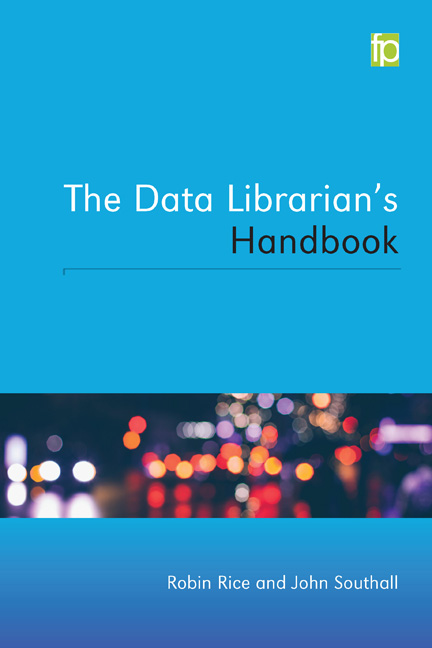Book contents
- Frontmatter
- Contents
- Acknowledgements
- Preface
- 1 Data librarianship: responding to research innovation
- 2 What is different about data?
- 3 Supporting data literacy
- 4 Building a data collection
- 5 Research data management service and policy: working across your institution
- 6 Data management plans as a calling card
- 7 Essentials of data repositories
- 8 Dealing with sensitive data
- 9 Data sharing in the disciplines
- 10 Supporting open scholarship and open science
- References
- Index
4 - Building a data collection
Published online by Cambridge University Press: 08 June 2018
- Frontmatter
- Contents
- Acknowledgements
- Preface
- 1 Data librarianship: responding to research innovation
- 2 What is different about data?
- 3 Supporting data literacy
- 4 Building a data collection
- 5 Research data management service and policy: working across your institution
- 6 Data management plans as a calling card
- 7 Essentials of data repositories
- 8 Dealing with sensitive data
- 9 Data sharing in the disciplines
- 10 Supporting open scholarship and open science
- References
- Index
Summary
Policy and data
A task faced by many data librarians is the acquisition and development of digital resources in the context of a larger library of printed material. This can be done through adoption of a range of procedures but there are also benefits in having a formal written policy. A formal description acknowledges that a policy fulfils many functions beyond being merely a tool for choosing materials. In addition to describing current collections, it encourages ‘the staff involved to (re)consider the aims and objectives of the organization, both long and short term, and the priorities to be attached to different activities. It assists with budgeting, serves as communication channel within a library and between the library and outside constituents, supports co-operative collection development, prevents censorship, and assists in overall collection management activities’ (IFLA, 2001).
Development of a formal policy is recommended and it ought to encapsulate the range of activities to be undertaken by the data librarian. It will involve selection of materials of course but will equally build on the relationships with readers within a department and library, mechanisms for promoting resources and receiving feedback, and raising the profile of your work within the larger organization. The policy needs to acknowledge that collection development can be different where data are concerned.
Data as a resource to be acquired
What are the various issues to consider? Many traditional topics to do with library print collections apply equally to those of us who are building up digital research data collections. Some institutions may regard the latter as more the responsibility of IT services or archival holdings if a digitization project has been involved, but the continuing evolution of academic libraries makes it important to stake a claim for responsibility in this area. In Data Basics, a seminal monograph on developing data libraries and support services, Geraci, Humphrey and Jacobs argue, ‘The role of the library is to Select, Acquire, Organize, and Preserve information, and to provide Access to and Services for that information. Although some librarians question these roles in the digital world … these are the activities that define a library. If an organization fulfils all these roles … what would we call it but “a library”?’ (Geraci, Humphrey and Jacobs, 2012, 65).
- Type
- Chapter
- Information
- The Data Librarian's Handbook , pp. 53 - 66Publisher: FacetPrint publication year: 2016



